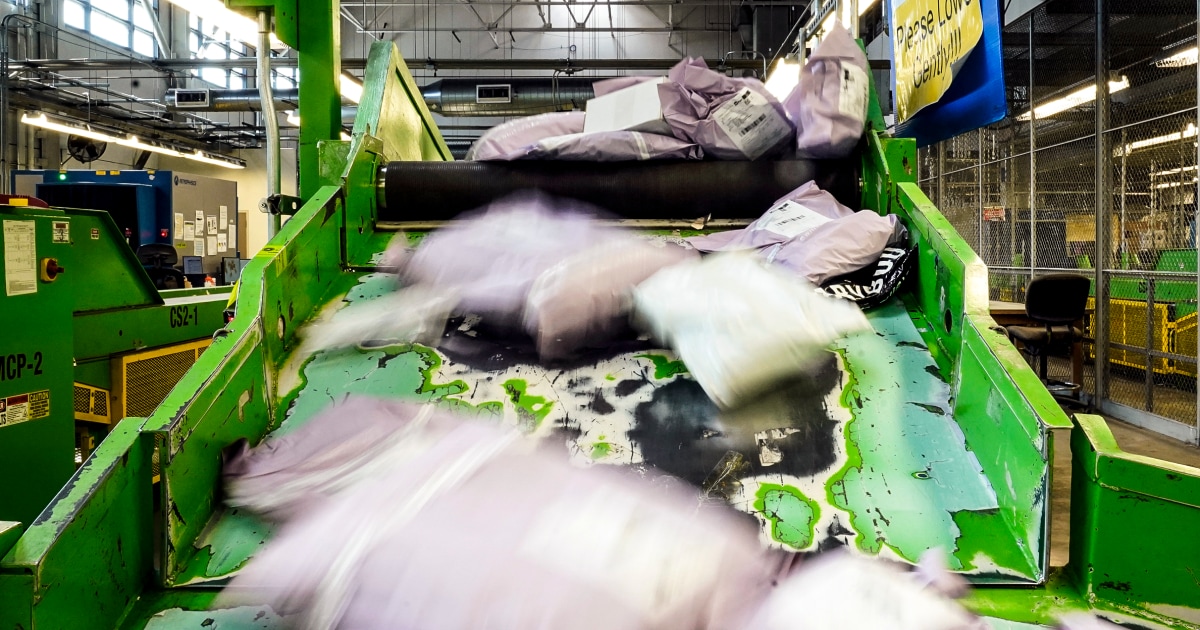D
Deleted member 365
Guest
I hope they do and they pay dearly for it! That stove needs to be hot as **** and it needs to burn a lot of ****ing hands off.The American people will eat the cost, and they ****ing deserve it.
I hope they do and they pay dearly for it! That stove needs to be hot as **** and it needs to burn a lot of ****ing hands off.The American people will eat the cost, and they ****ing deserve it.
I hope they do and they pay dearly for it! That stove needs to be hot as **** and it needs to burn a lot of ****ing hands off.
Good. That’s what needs to happen! Bring on the recession. Hell, bring on a depression! Americans need to learn to not empower morons. Elections have consequencesWhen these costs trickle through the supply chain it gonna make US exports incredibly uncompetitive

This is not good….
Postal operators around the world have announced they will suspend certain deliveries to the United States, ahead of an end to a long-standing tariff exemption for packages worth $800 or less.
President Donald Trump has framed the decision as part of a fight against illegal drugs. But mail companies say that many aspects of the new rules remain unclear.
Here’s what to know.
The facts
- Previously, most imported goods with a value of $800 or less were exempt from tariffs. That rule, known as the de minimis exemption, is set to end on Aug. 29 — though letters or personal gifts worth less than $100 won’t be affected, postal operators said.
- A number of national mail companies around the world from Europe to Asia and the Pacific have responded by temporarily suspending some mail services to the U.S.
- For consumers, this could mean delays in receiving packages — which may now also incur tariffs of $80 or more.
- The move stems from sweeping tariffs the president imposed on most U.S. trading partners earlier this year.
What are the changes?
The de minimis — which in Latin means something too small or insignificant to be considered — tax exception was passed by Congress in the 1930s and amended over the years. Under the Obama administration, the exemption was raised from $200 to $800 — where it remained until this year.
The exemption allowed companies to save tens of billions of dollars in fees on cheap imports, most of which came from China — though Etsy sellers and family-run businesses also benefited from the rule.
The Trump administration ended the exception for China and Hong Kong in May. In an executive order signed last month, Trump extended the decision to all countries starting Aug. 29, meaning that most low-value parcels will also be charged tariffs.
Which countries are affected?
National mail services in more than a dozen European countries have said they are pausing at least some of their deliveries until they have figured out how to deal with the new rules.
In Germany, Deutsche Post and DHL Parcel Germany said they were temporarily suspending business customer parcels to the U.S. beginning Saturday — though shipments via DHL Express are not affected.
Belgium’s Postal Service suspended shipments containing merchandise starting Saturday, while Spain’s Correos said that it will not accept packages worth $800 or less beginning Monday. France’s La Poste saidit may be forced to temporarily suspend some shipments unless a solution is reached before the implementation date. Britain’s Royal Mail said it plans to withdraw its services for a day or two, before rolling out a system to deal with the requirements.
Suspensions have also been announced across Asia and the Pacific. India’s Department of Posts said that it would temporarily stop mail service to the U.S. beginning Monday. Thailand temporarily suspended all international postal parcel services to the U.S., while South Korea, Singapore and New Zealand suspended most shipments. Australia Post has temporarily suspended what is known as transit shipping — where goods from other countries are shipped to the U.S. via Australia.
U.S. Customs and Border Protection did not immediately reply to a request for comment.
What will it mean for shipping costs?
The extra charges on a package will depend on the methodology used to calculate it, according to the executive order. The duty rate will either match the level of tariff the U.S. has imposed on the country of origin, or a specific duty based on the following:
The new rules could also put the onus on senders to pay import duties before the shipment leaves for the U.S., according to Belgium’s bpost. It said in a statement the changes mean “import duties for all shipments with goods must be prepaid, regardless of value.”
- For countries with a tariff rate of 15 percent or less, such as Britain, each package will incur an additional charge of $80.
- Parcels originating from countries with U.S. tariffs of between 16 and 25 percent will incur an additional $160.
- Countries with a tariff rate of more than 25 percent will face an extra $200.
Letters, documents and gifts under $100 are exempt — though DHL said in a statement that any parcel declared as a gift “will be subject to even stricter controls than before to prevent the misuse of private gift shipments for sending commercial goods.”

European postal services halt U.S. shipments as tariff exemption ends
End of duty-free threshold: The U.S. is eliminating its “de minimis” exemption, which let packages worth under $800 enter the country without duties.www.consumeraffairs.com
- End of duty-free threshold: The U.S. is eliminating its “de minimis” exemption, which let packages worth under $800 enter the country without duties.
- Shipping suspensions: Postal operators in Germany, Denmark, Sweden, Italy, France, Austria, and the U.K. are pausing or restricting shipments to the U.S. amid uncertainty.
- Tariff confusion: With little clarity from U.S. authorities, carriers warn of delays, higher costs, and widespread disruption to cross-border e-commerce.
First tariffs, now this
The suspension comes just weeks after Washington and Brussels agreed to impose a 15% tariff on most EU goods. Packages previously exempt under the $800 threshold will now be subject to the same duties.
The U.S. already ended duty-free entry for Chinese goods in May, part of the Trump administration’s push to curb imports of inexpensive foreign products. That restriction is now being extended worldwide.
Postal operators say they were given too little time to prepare for the change. Italy’s Poste Italiane, France’s La Poste, and Austria’s Austrian Post each cited unclear U.S. guidance and a lack of updated customs systems. PostEurop, representing 51 European postal operators, warned that if no solution is found by August 29, all its members may suspend U.S.-bound shipments.
“If you have something to send to America, you should do it today,” PostNL spokesperson Wout Witteveen told the Associated Press.
If Trump takes the driver seat over the Fed we're in for the worst depression in history.We are barreling toward something, and I don’t think it will be good.
President Trump’s attempt to fire Federal Reserve governor Lisa Cook is the most dramatic step yet in his effort to take control of the independent central bank and its vast authority over interest rates.
Trump has for months demanded the Federal Reserve lower rates to boost the economy, make housing more affordable, and lower the cost of servicing the national debt. He has castigated Fed Chair Jerome Powell for not moving sooner to cut them. By replacing Cook, he could add enough voices to the seven-member board of governors to potentially outvote Powell and move interest rates in his preferred direction.
“To the extent that Fed independence stands for anything, it stands for the idea that monetary policy should not be made by the whims of the sitting president,” Peter Conti-Brown, a financial and legal scholar at the University of Pennsylvania, said late Monday night. “If we allow this to become the norm, then this is the end of Federal Reserve independence as we know it.”
Trump’s decision to remove Cook set up a clash over how much power the president has at the central bank. Cook said late Monday night that Trump has no authority to fire her and that she would continue in her job. Her lawyer, Abbe Lowell, said Trump’s “demands lack any proper process, basis or legal authority. We will take whatever actions are needed to prevent his attempted illegal action.”
Trump’s move comes at a delicate moment. The Fed has held interest rates steady at between 4.25% and 4.5% for five straight policy meetings so far this year, largely out of concern that tariffs would maintain upward pressure on inflation, currently above the Fed’s 2% target. But in a speech last week, Powell, citing risks to the labor market, began to shift Fed officials toward a possible interest-rate cut as soon as next month.
……..While the immediate effect on the pace or size of interest-rate cuts is unclear, the longer-term effect is more significant. By getting more control of the Fed, Trump could influence the direction and level of interest rates for the rest of his term. The immediate effect of cuts could be a boost to spending and growth. But the longer-term risk is higher inflation if Trump’s appointees go on to hold rates lower than economic conditions warrant.
The institutional implications could reverberate for years. Historically, the president’s only direct influence on monetary policy has been through nominating governors. Once in place, he couldn’t direct how they voted.
By showing that a sufficiently determined president can find a way to remove a Fed governor mid-term, Trump’s move would effectively curb the independence of the central bank. Over the long run, a less independent Fed might be slower to respond to price pressure and result in a higher inflation rate and thus higher long-term interest rates.
“It’s a dark day for the central bank,” said David Wilcox, an economist at Bloomberg Economics and the Peterson Institute for International Economics who previously directed research for the Fed board. “This is going to cause tremors in the foundation that underpins monetary policy in the United States, and those tremors will be felt in financial markets domestically and around the world.”
Legislators responded along party lines. “This is blatantly illegal, and Trump knows it,” Rep. Don Beyer (D., Va.) said on X. “Trump is putting our financial system at risk over bogus claims of fraud—an offense of which he himself was convicted.”
Sen. Rick Scott (R., Fla.) said Trump “is doing the right thing to hold people accountable, protect American families, and restore trust in the Fed.”




The only ones who'll care are any who actually lost a job. The rest? Eh, ****'em, we got ours. They can go to hell. Praise Jesus!Terrible jobs report. Good. It's probably the only way to get the Trumptards off the Kool-Aid.
Yeah, but wait till all those “palaces of genius” start to rise!Terrible jobs report. Good. It's probably the only way to get the Trumptards off the Kool-Aid.
